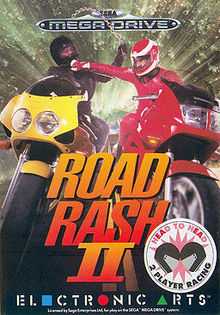Road Rash II
| Road Rash II | |
|---|---|
 European cover art | |
| Developer(s) | Electronic Arts |
| Publisher(s) | Electronic Arts |
| Composer(s) | Rob Hubbard Don Veca |
| Series | Road Rash |
| Platform(s) | Sega Mega Drive/Genesis |
| Release date(s) | |
| Genre(s) | Arcade racing |
| Mode(s) | Single-player Two Player Multiplayer |
| Distribution | Cartridge |
Road Rash II is the second game in a series of motorcycle-racing video games by Electronic Arts. It was released in 1993 for the Sega Mega Drive. It is based heavily on the engine and sprites of the first game. Road Rash II introduced several new features to the series, including bikes with nitrous oxide injection and varied weapons. Many fans consider Road Rash II to be the best installment in the series.
Overview
The races took place in the U.S. states of Alaska, Hawaii, Tennessee, Arizona, and Vermont, on progressively longer two-lane roads. Races would be won by placing first, second, or third in each of the five tracks (as opposed to the first game, which would allow a victory by placing fourth as well). After all five tracks were won, the player would advance to the next level, where the track would be longer, the opponents faster, and much more money at stake for a victory or a loss.
The second Road Rash game introduced two major features to gameplay. One is the fighting system and the addition of a second weapon—the chain. Where in the first game one strong hit would deplete the opponent's life bar, in this game each weapon's attacks dealt a set amount of damage. The other main addition to gameplay is of bikes containing nitrous oxide injection, which allows the user's motorcycle to accelerate beyond its top speed for a short amount of time. This addition would continue throughout several games later in the series.
One of the most noticeable differences in the game is the change of the menu screen. Road Rash II made navigation of the menu screens considerably easier, as well as gave the game a password less than half the size of the first game's passwords. Also, several game modes were introduced; alongside the two modes from the first Road Rash were a true two-player game called "Split Screen" where the 14th and 15th players are replaced by human players, and a duel mode called "Mano a Mano" where the two human players can select any bike, weapon, and length of track they wish before racing each other.
Sound
The game features a Rob Hubbard soundtrack.[2]
Reception
| Reception | ||||||||||||||||||||||||||||||||||||||||||||||||||||||||||||
|---|---|---|---|---|---|---|---|---|---|---|---|---|---|---|---|---|---|---|---|---|---|---|---|---|---|---|---|---|---|---|---|---|---|---|---|---|---|---|---|---|---|---|---|---|---|---|---|---|---|---|---|---|---|---|---|---|---|---|---|---|
| ||||||||||||||||||||||||||||||||||||||||||||||||||||||||||||
Road Rash II was given a 9/10 on the HonestGamers website.[4] Mega placed the game at #19 in their Top Mega Drive Games of All Time.[5]
References
- ↑ 1.0 1.1 1.2 Road Rash II at GameFAQs
- ↑ "Road Rash Technical Details". GameSpot. Retrieved 2007-10-12.
- ↑ MegaTech rating, EMAP, issue 22, page 99, October 1993
- ↑ K T (2005-06-10). "Road Rash II (Genesis) review on HonestGamers". HonestGamers. Retrieved 2009-10-29.
- ↑ Mega magazine issue 26, page 74, Maverick Magazines, November 1994